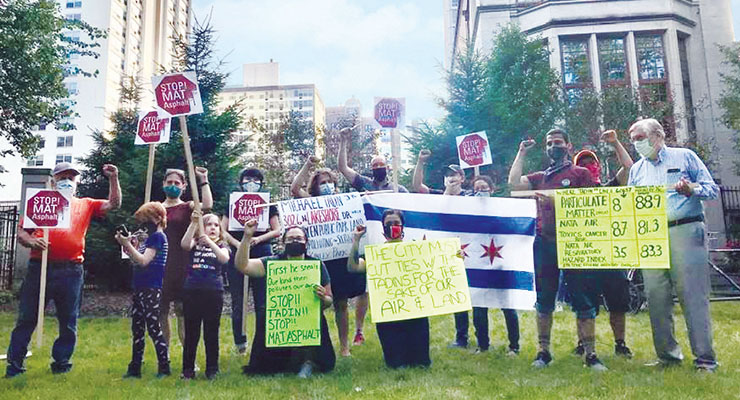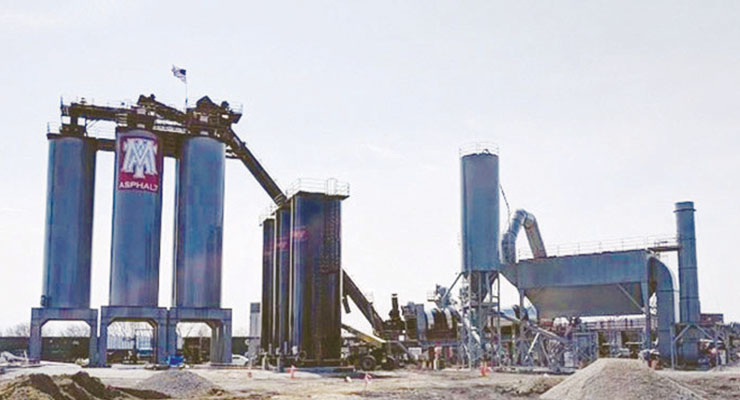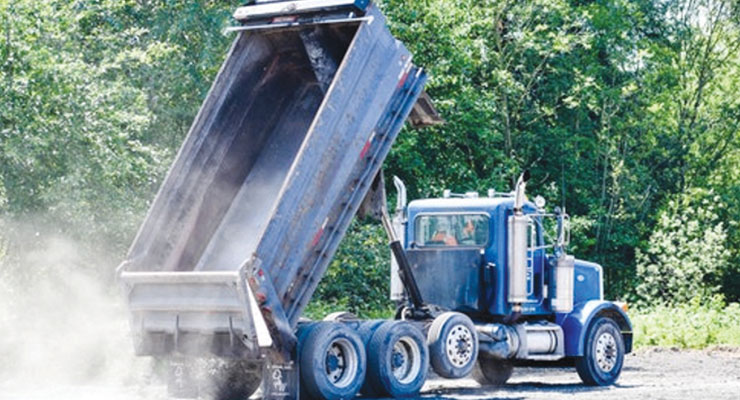By Kayla McLeod and William S. Bike
Editor’s note: After this article was published on Aug. 5, MAT Asphalt got back to Gazette Chicago with comments and other information for this article. The new information is included in this version.
With Chicago in the process of awarding a five-year contract to produce millions of tons of asphalt, community residents and seven aldermen are urging the City to uphold its contracting standards and health protections when selecting an asphalt producer—and the City is listening.
MAT Asphalt established a plant in the McKinley Park neighborhood in 2018, and in March it submitted a bid to the City for $500 million worth of work providing City crews with asphalt. In the last week of June, however, the City rejected all bids submitted by MAT Asphalt and other firms and demanded that the companies show plans to control pollution before submitting new bids.

Neighbors for Environmental Justice (N4EJ) protest against MAT Asphalt. The City has requested new environmentally friendly proposals.
MAT Asphalt was the only asphalt producer that bid on the entire project, including providing asphalt for street repairs and potholes.
Eight alderpersons, led by Ald. Byron Sigcho-Lopez (25th), had sent a letter to City Chief Procurement Officer Aileen Velasquez asking for a higher level of scrutiny when the City evaluated the environmental impacts of the contractors’ proposed work, and the City complied.
“We believe this contract requires a degree of consideration, public involvement, and environmental awareness proportional to its large size and long duration,” the City Council members wrote.
“The [City] Department of Transportation [CDOT], the Department of Public Health [CDPH], and the Department of Procurement Services [CDPS] are working together on a revised solicitation for citywide asphalt production to better address environmental and public health concerns,” according to a statement from the City.
“The City has rejected all bids received,” the statement continued. “We see an opportunity to revisit this bid in a way that would allow us to responsibly procure the asphalt needed to support our transportation infrastructure, while also protecting the environment and human health, and promoting sustainability. CDOT anticipates issuing a new solicitation by October 2022 for asphalt production that will incorporate a variety of CDPH recommendations to minimize onsite and air pollution from truck emissions; reduce odors, noise, and dust; and optimize energy consumption.”
“We look forward to the added environmental requirements for all bidders and we plan to rebid to whatever the specifications are in October,” said MAT Asphalt co-owner Michael Tadin Jr.
“At the same time, we are disappointed for Chicago citizens and visitors who will now face delays in improved City road conditions. We are also disappointed in the City’s decision to pass up over $50 million in savings that our lower bid offered. Since our operations began four years ago, we have shown, time and again, that we take extraordinary steps, beyond what is required and beyond industry norms, to minimize pollution.”
Toxins in communities
Sigcho-Lopez told Gazette Chicago,“The City’s decision to halt the asphalt process was a collective ask from myself and seven other aldermen due to the pollution that Chicago encounters, specifically in our Black and brown communities. In order to help eliminate the chemicals/toxins that are released in our communities, I stand by the decision of the City until a clear plan of pollution control is put in place.”
McKinley Park residents, already unhappy with MAT Asphalt, are concerned that giving the company any further contracts would worsen the effects MAT’s plant already has had on their community.

MAT Asphalt submitted a bid to the City for $500 million worth of work providing City crews with asphalt.
The plant sits at 2055 W. Pershing Road, right across from McKinley Park, one of the area’s largest parks.
“This isn’t just like a neighborhood pocket park sort of thing,” explained Anthony Moser, McKinley Park resident and board member for Neighbors for Environmental Justice (N4EJ). “This is actually a community hub for people all over the Southwest Side to come play soccer, go jogging, go swimming. There are tennis courts, there’s a lagoon where people fish, there’s a community garden.”
Moser went on to list other beneficial community hubs in the area, including a National Latino Education Institute and several schools that use the park for educational purposes.
“The company never really gave any advance notice to community members that this plant was going to be operating right across the street from the park and several schools and learning facilities,” said Carlos Enriquez, communications director for the Southeast Environmental Task Force and a member of the Chicago Environmental Justice Network.
N4EJ captured drone footage above the areas to show the sharp contrast between the park and schools and MAT Asphalt’s plant. See www.youtube.com/watch?v=3Un3-pn8tSs.
Impact on community
When MAT asphalt started operations in July 2018, it created an immediate impact on the community, Moser explained.
“If you’ve ever driven past a road being paved and your windows are rolled down, you can smell it right?” Moser asked, noting that, with the plant in a residential community and next to a park, “Instead of just driving through it though, you wake up and that’s just what it’s like outside. In some cases, if you live close enough, it smells like that in your living room.”
The MAT Asphalt plant had the most air pollution complaints of any address in the City in 2021, according to N4EJ.
Besides the air pollution, Moser stated the vehicle traffic MAT Asphalt has added to local streets also has hurt the community. Large numbers of diesel-powered trucks coming and going from the plant raise concerns for Moser and his group about danger on streets where residents are walking, biking, and taking their kids to the park.
McKinley Park residents felt they were ill informed about MAT Asphalt’s operations before the plant opened, prompting several residents to form N4EJ.
“We started up in reaction to MAT’s sudden arrival; we are still working to shut them down,” according to an N4EJ statement. “But we’ve also been connecting our experience to underlying conditions that produced this situation: environmental racism; corruption in the City, State, and Federal government; and a widespread political belief that industry is more important than the health of marginalized people.”
“Over five months ago, we publicly shared results from a study that showed our plant’s emissions are about one-twentieth of the allowable regulatory limit–and less than Onepercent of the permissible amount of particulate matter,” Tadin countered.
“That study was observed by the Illinois Environmental Protection Agency with a protocol approved by the U.S. EPA. It confirmed what we have been telling the McKinley Park community since we began operating in 2018: Our state-of-the-art facility is one of the most environmentally friendly asphalt plants in the nation.”
MAT Asphalt asserted in a Jan. 21 document that its plant’s emissions “are about one-twentieth of the allowable regulatory limit–and less than 1% of the permissible amount of particulate matter, according to results of a recent study conducted by CleanAir Engineering.” The onsite testing that resulted in this finding was observed by the Illinois Environmental Protection Agency and approved by the Federal Environmental Protection Agency.
Environmental promises
Enriquez explained Mayor Lori Lightfoot ran on environmental promises, including reopening the City’s Department of the Environment.
“What we’re looking at, the better part of three years now, of her in office, she has done absolutely nothing to look into what establishing a Department of Environment would be,” said Enriquez.

Sigcho-Lopez added he would “like to see the City implement a safe and fair process to reconvene the City’s Department of Environment.”
He noted that, “In Chicago, there are many offices involved when it comes to industrial corridors and the monitoring of pollution, including CDPH at the municipal level, IL-EPA at the State level, and US EPA Region 5 at the Federal level. This makes the industrial permitting and licensing process confusing and convoluted.”
“Case-by-case permits and licensing reviews do not take into consideration large cumulative effects of pollution on communities that are nearby these operations,” he continued. “That is why the City needs a municipal level department to exclusively focus and collaborate with State and Federal agencies in order to ensure a better process.”
Both Moser and Enriquez expressed frustration that the City chose the McKinley Park community as a cheap, centrally located location for an asphalt contractor but City officials never considered the health impact such a move would have on their own residents.
“The City is basically treating this as a freebie,” Moser said. “But there’s this centralized cost, which is people who live near the plant are experiencing this reduced quality of life and measurable health impacts on air quality.”
In terms of pollution, increased asphalt production is “always a concern,” said Peter Orris, MD, chief of occupational and environmental medicine at the University of Illinois Hospital and Health Sciences System. “Asphalt plants have the potential to release particulate matter, nitrates, sulfides, polyaromatic hydrocarbons, and heavy metals, some of which are potential carcinogens.
“The level of danger depends on the asphalt manufacturing process, how effective the plant’s pollution devices are, and how close it is to residents, so it’s not a simple yes or no question as to whether increased asphalt production will be a problem,” Orris continued.
He noted asphalt producers have a responsibility to prove they are not increasing pollution.
Orris added that interested parties “have to assess what the burden is on that community already. Can it take more pollution, or is it already too overburdened? There needs to be a careful environmental and health assessment, and that also is the responsibility of the company.”
MAT Asphalt asserted that its facility emits “extraordinarily tiny levels of pollution in relation to U.S. Environmental Protection Agency requirements.”
The 2021 study “confirms the assurances that we have been giving our neighbors and the entire McKinley Park community since we began operating in 2018,” said Tadin. “Our state-of-the-art facility is one of the most environmentally friendly asphalt plants in the nation.” For more on CDOT, CDPH, and CDPS, go to www.chicago.gov. For Enriquez, email [email protected]. For N4EJ, call (773) 633-9934. For MAT Asphalt, log on to www.matasphalt.com. To see a video of its operations, visit https://tinyurl.com/MATAsphalt. To contact Orris, email [email protected]. For Sigcho-Lopez’s office, log on to www.25thward.com.
